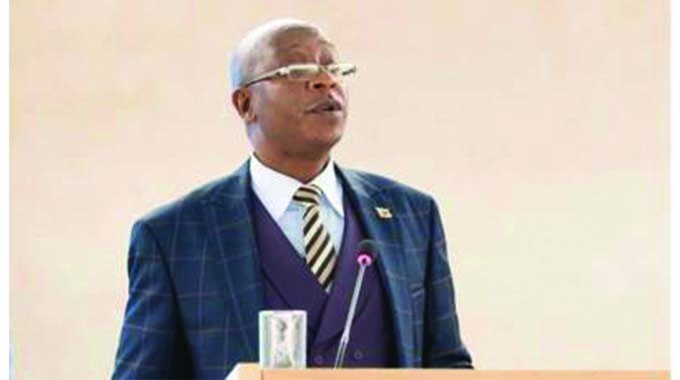Nothing to stall Death Penalty Abolition Bill

Zvamaida Murwira, Harare Bureau
THE adverse report on the Death Penalty Abolition Bill by Parliament’s Legal Committee (PLC) will not stop the Bill from sailing through as engagement has since begun to ensure nothing will stall its passage in both Houses of the National Assembly.
The legal committee argued that the Constitution allows the death penalty for aggravated murder by an adult and so abolishing the death penalty requires a constitutional amendment.
On the other hand, supporters of the Bill argue that the Constitution simply allows Parliament to pass a law allowing the death penalty but does not require Parliament to do so, thus the Bill is simply a proposed law where Parliament declines to take up the option.
In an interview yesterday, Justice, Legal and Parliamentary Affairs Minister Ziyambi Ziyambi said they did not expect the PLC adverse report on the Bill to affect it given that Cabinet had already adopted a decision to support it.
The proposed law was brought to Parliament through a Private Members Bill by Dzivarasekwa legislator Mr Edwin Mushoriwa (CCC).
“We have noted the adverse report from the PLC in its exercise of its mandate to scrutinise all Bills and Statutory Instruments coming before Parliament,” said Minister Ziyambi.
“There will be an engagement of all stakeholders so that nothing will stall its passage. There are a number of ways to deal with it; one of which includes to have the PLC to withdraw its adverse report.
“But the bottom line is the Bill is on course to sailing through Parliament. Remember, Cabinet has given its nod to have the Bill sail through Parliament.”
In presenting the adverse report, PLC chairperson Cde Itayi Ndudzo said they felt that its enactment contravened Section (2) and Section 48 (2) of the Constitution in that it sought to abolish what has been permitted by the Constitution.
“It is inconsistent with the spirit and purpose of Section 48 (2) which is permissive to a death penalty law being enacted. Section 328 (1) of the Constitution of Zimbabwe defines a Constitutional Bill as a Bill that seeks to amend the Constitution,” said Cde Ndudzo, who is also Hwedza legislator.
“Subsection (2) further states that an Act of Parliament that amends the Constitution must do so in express terms. The import of the Death Penalty Abolition Bill in fact, seeks to amend the provisions of the Constitution, in particular Section 48 (2) of the Constitution. The Bill is not a Constitutional Bill as it does not expressly state that it seeks to amend the Constitution.
“Therefore, the proposed Bill takes away the permissive intention of the Constitution to have a death penalty and in any case, if any amendment is to be proposed on the death penalty, it is our considered opinion that it has to be introduced as a Constitutional Amendment Bill.”
Commenting on the PLC report in the National Assembly last week, Mr Mushoriwa said he did not agree with their observations.
He said Section 48 of the Constitution seeks to protect the right to life which is what his Bill seeks to achieve.
“The second issue is that if you read Section 48 (2), it says a law may permit the death penalty to be imposed only on a person convicted of murder committed in aggravating circumstances,” said Mr Mushoriwa.
“The key word there is ‘may’. It is not saying a law must. What has happened, Honourable Chair, is that the death penalty is not a creation of the Constitution, but what has happened is that the framers of the 2013 Constitution gave that power to the people of Zimbabwe and to their Parliament to either make a law or not to make a law that introduces a death penalty. This is the reason, I believe that the point of departure which I believe the Committee erred is not to remove or to tamper with the provision.
“The power of the Constitution is not being taken away. In fact, what this means is that this Parliament should pass this Bill and I am glad that two days ago, the Cabinet of Zimbabwe led by President Emmerson Mnangagwa approved the principles of this Bill having gone through the various technical support in the Ministry of Justice, Legal and Parliamentary Affairs and the other arms of Government.”

Hatcliff legislator, Mr Agency Gumbo (CCC), said what Section 48 of the Constitution sought to do was to create room or provide room for an exception to be created by Parliament through an Act of Parliament.
“The Bill which was presented to this House does not carry with it the import of a constitutional amendment. The Bill does not take away the permissive power or the permissive provision that is subsection (2) of Section 48 of the Constitution. It addresses that which can be done by Parliament which is permitted by the Constitution,” said Mr Gumbo.
Zanu-PF Chief Whip Cde Pupurai Togarepi said there was a need for Mr Mushoriwa, who moved the motion, to engage the legal committee for a way forward.
“I think, when we debated, the House seemed to converge on the issue of abolition. I was listening to the fundis and when we use the word ‘abolition’, it is like you are amending the Constitution, but if we are amending the Act, it is allowed to do so using the powers invested in this House.
“So, I think it would be prudent that we allow the mover of the motion and the Parliamentary Legal Committee to find common ground. As you are aware, the principles of this Bill were approved by Cabinet, meaning that Cabinet also in their wisdom, together with the law officers, and the Attorney-General, seem to think that we are moving in the right direction if we were to enact this law.
“In my view Mr Chairman, I think we need some interaction between the PLC and the mover of the motion and maybe through this debate, we allow them a different time to look at it. We cannot move away from this law because it looks like that is what the people of Zimbabwe want, our Cabinet, Chaired by His Excellency, has already given a nod to the principles.”










Comments